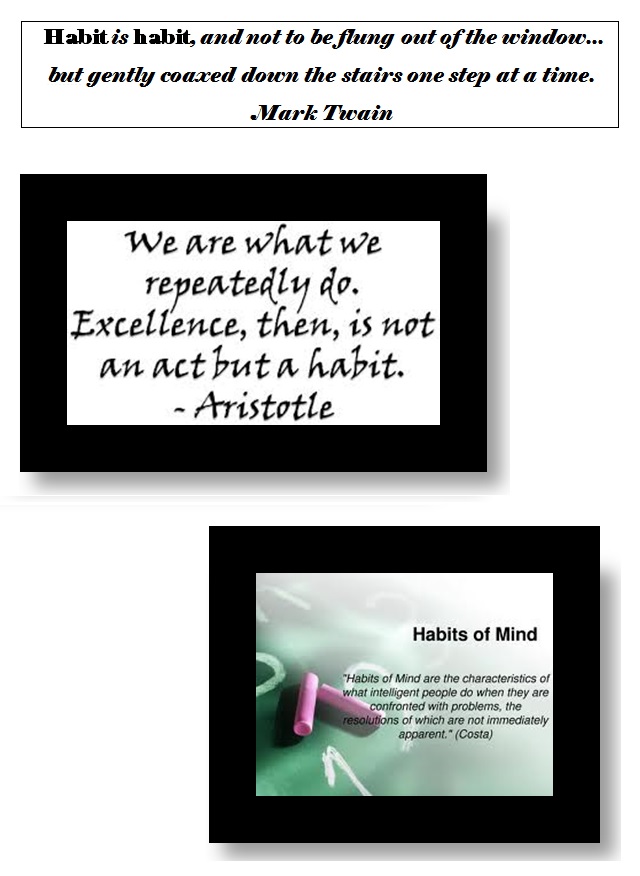Automatic Self-Talk—Not the Friendliest “Voice” in Town
January 19th, 2014
We need to become conscious of this thing that has been called “self-talk.” If you take 15 seconds to listen to this internal monologue that goes on in our brain you will discover that it is automatic and it is actually unlikely that we are generating it. Consider that if we were the source of it, if we were generating it, then it stands to reason we would know how to stop it, we would know where the shut-off valve is. Nobody has found it because the valve doesn’t exist.
I would also ask you to consider that this “self-talk” begins to operate in our brain when we are approximately 12-15 months of age. During this time the process is neutral; that is, we are taking in new information, learning to distinguish sounds and words (an ability which actually began in the womb), beginning to learn and process both the receptive and expressive sides of our language ability. We are fully immersed in learning to understand what is being said and how to say it. By the time we are six years old, we have faced many developmental challenges (e.g., feeding ourselves, sitting up, crawling, walking, toilet training, exploring our environment, going to preschool or kindergarten). During this time our brain internalizes these same attitudes and mannerisms which originated in external sources (e.g., parents, relatives, teachers). Our brain mimics what is heard and experienced.
Every brain has this operational mechanism. If you are human, you have
a brain and—like it or not—your brain is not the exception to this rule.
Therefore, you have this operational mechanism. And—like it or not—this
mechanism within your brain has no off-switch and will be—until your brain
ceases to function—as constant as your shadow in the sun.
The degree to which we experience physical and emotional assurance, the degree to which we experience verbal encouragement is the degree to which we feel a sense of physical comfort and trust; independence, autonomy, and competency. Likewise, the degree to which we face harsh disapproval—physically, emotionally, verbally—is the degree to which we will feel mistrust, shame, doubt and guilt and inferiority—all of which get reinforced by the brain’s capacity to internalize and mimic that which is originally external.
There is an additional component to this mechanical mechanism. If you will take a moment and listen once again to this inherited mechanism (no more than 15 seconds is needed) you will discover this 24/7/365 monologue is only and always only 1) judging, 2) assessing, or 3) evaluating. For example, you may hear something like, “I don’t understand, why only 15 seconds… 15 seconds is too long… this is stupid… what mechanism?… my nose itches”… etc.. If you examine this stream of thought you will discover that it is a never-ending stream of commentary.
There is a tendency to think that this “inner voice” (which at best is demeaning and at worst vitriolic) will motivate us (e.g., “you could do better,” “if only I would have,” “next time I must,” etc. etc., etc.). But the reality is that if that were true, we would only need to hear them once and we’d feel the graceful impact of empowerment and encouragement upon our actions and emotions.
Immediately below, you will see a conceptualization of these automatic mechanical thoughts. Outside the circle are undistinguished presuppositions about the nature of life (again, based in more judgments/assessments/evaluations).
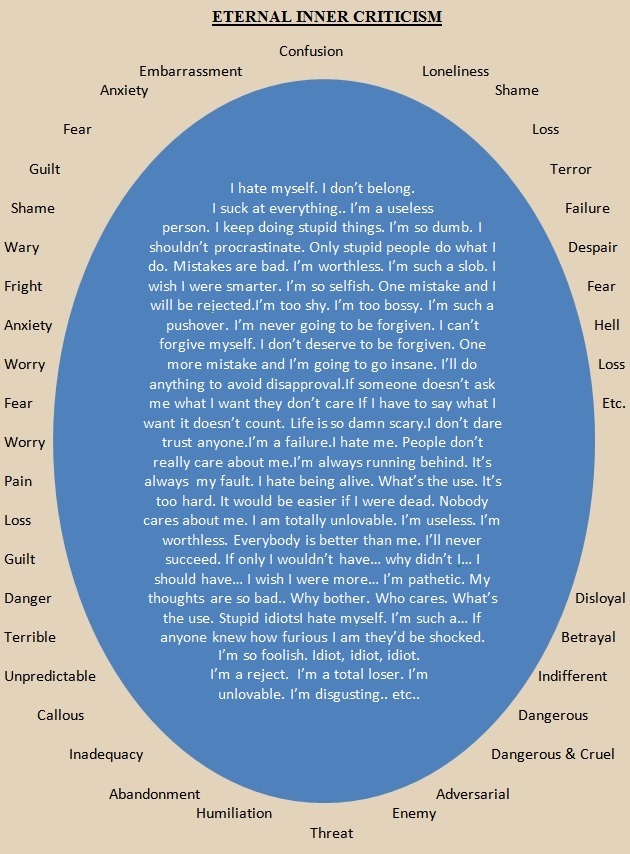
Here’s another way to capture the essential facet of this eternal inner criticism:
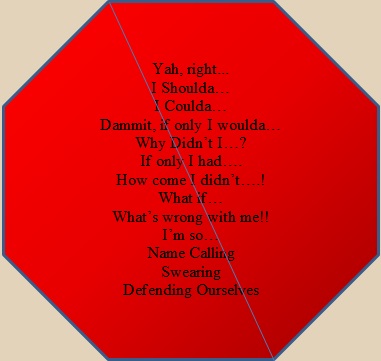
The constant automaticity of this critical monologue leaves us feeling shamed and guilty, discouraged, defeated and emotionally bruised.
This monologue and its impact are both abusive.
Just as we are not entitled, nor given a legal right, nor a just claim, nor any authorization to be abusive to any individual, so too we are not entitled to, nor given a legal right, nor just claim, nor any authorization to abuse ourselves. Given we are not entitled to be abusive toward ourselves and given we cannot turn off this very mechanism which so greatly disturbs us, is there still any way of being that can deflect this mechanism’s impact upon us and upon our inner equanimity which we so sorely miss?
There is a practice to adopt, to begin to use daily. And to best understand it let us think of this automatic mechanization of the brain as an ox, an ever-present ox, an unruly ox-a creature whose brutish nature and indiscriminate use of sharp horns must be tamed. Taming the bull, disciplining the bull, requires a constancy of intent which at first we do not have. It is the practice itself (as described below) that creates the constancy of intent. Here is one such practice:
- It is not important whether you begin by taking on this practice for 15 seconds a day, or 1 minute a day, or 2 minutes in the morning, 2 in the afternoon, 2 in the evening, 2 at night. What is important is that you begin the practice. Remember, any thoughts you hear regarding this process while you are doing this process are mechanical. It is the machinery wanting to maintain the status quo of its operation.
- Say to yourself: “Stop” or “No” or “Wait. There is no condition under which I am entitled to assassinate my character or to be abusive.”
- If it is helpful either literally or within your imagination extend your hand in a stopping gesture to get your attention and repeat, “stop” or “no” or “wait.”
- Doing so is like stopping your car at the stop sign. The stop sign does not stop the car. You do. And you may not want to stop the car, but stopping the car, or taming the ox requires that you apply the brakes or pull on the ox’s halter.
- In your own words (or feel free to borrow these) say (out loud is best but if said silently listen with intent): “I am willing to listen to anything there is to say to myself…anything. From the sublime to the mundane, to the profound to the profane, to the most vulnerable, to the silliest, to the most fearful, to the most embarrassing, to the most frightening…I am willing to listen to anything I have to say to myself—absolutely without any exceptions.”
- Then say, “It must be said respectfully, no shoulda, coulda, woulda, etc.” (Refer to diagrams above).
- One of two experiences will occur:
- Your mind for a moment or two will be very quiet; or
- You will find a loophole in the above stop sign diagram and proceed with abusive thoughts. If that is the case, please add that thought mechanism into the diagrams and return to step 1.
- One of two experiences will occur:
- Ask yourself the following two questions:
- What am I feeling right now? (See the last two pages for assistance in identifying feelings). If you know, name and accept the feeling…or accept you don’t accept the feeling. If you don’t know, tell yourself, “I don’t know YET.” The word “yet” leaves you with the possibility that you can and will now at some other time in your future.
- What do I need right now? If you know what you need, name and accept the need and name the steps needed to fulfill the need. If you don’t know add the word “yet” and tell yourself, “I don’t know YET.”
For the time being, that is all there is to do. The focus is not on the results. The focus is not on changing the machinery. When you find yourself focusing on that (which you will), return yourself to the practice of intervening (just as a referee intervenes in the game when a foul has been committed). The focus is an intention practice of stopping in moment the abusive machinery and inviting yourself to begin an intimate respectful conversation.
Fear of the Unknown — Curiosity
December 26th, 2013

To begin with, understand that fear of the unknown is basically an unwillingness to deal with or accept anything new or unfamiliar. Whatever the cause of our fear, one of the very first things that we will find helpful—whether we like this or not–is to confront the fear. Here are some specific steps that can be used to begin the process of confronting fear:
First, it is important to acknowledge that we have feelings of concern or fear about the thing that we must do. It does no good to turn from these feelings or to try and pretend they don’t exist. If we do try to submerge them without acknowledging them, they will only surface later and be much stronger. It serves us to realize that the feelings are there for a reason. We are about to enter an area in which we may need to exercise awareness and caution as we proceed. Notice I said, “…as we proceed.” Fear is not emotion that tells us to stop. It is far from that. Fear is an emotion that simply tells us to be very careful as we go forward. It tells that we are stepping out of what we know and are comfortable with. Stepping out of our comfort zone is the only way to truly learn and grow.
The next step to dealing with fear is to be able to feel it and do what needs to be done regardless. Everyone feels fear at some point or another or for one reason or another. It is the successful person who feels the fear and goes forward anyway. We can feel the fear of the unknown and transmute it into a positive energy to sustain to the other side of that darkness and by doing so, we become stronger in our own right. There is much to be gained and little to be lost by going forward despite our fear. However, we stand to lose so much by letting fear stop us before we get started. Moving forward in the face of our fear brings us to the next step in learning how to deal with fear…
Trust. Trust that you were wise enough to get help from your chosen teacher or guide. Trust that you are strong enough to make it through the obstacles you are confronting in life. Trust that you are smart enough to be patient when things don’t appear to happen fast enough.
Fear of the unknown l comes to us all. That is the nature of being alive Fear can be daunting, and seem insurmountable, and all encompassing, making us want to turn back. When faced with this fear, that is the time to proceed with heightened awareness, extended caution, and careful attention to process. Acknowledge the emotion of fear, and trust that a higher purpose is at work on your behalf. You will come to realize that fear—like any other emotion—does not control us unless we allow it to. In fact, we can use the fear to make us better, stronger, and able to face the next challenge as it arises. (Author of this article is unknown)
Effective Appology
November 23rd, 2013
The Five Ingredients of an Effective Apology
Guy Winch, Ph.D.
Apologies are important in any society. As children we are taught to say “I’m sorry” pretty much as soon as we are able to construct a full sentence. Unfortunately, our skill level doesn’t improve very much from there. More often than not apologies made by adults are just as insincere and unconvincing as those made when we were children.
Why are we so bad at apologizing?

Ask yourself (or someone else) why you (or they) are offering an apology in a given situation and the answer is likely to be one or more of the following:
“I’m apologizing because I was wrong/mistaken/at fault”
“One should/is expected to apologize in such situations”
“It’s the right/mature/responsible thing to do”
And therein lays the problem. Because while such motivations are well and good, none of them reflect what the apology actually aims to achieve. Read more »
Each of us an artist, each life a canvas
November 20th, 2013

“A writer – and, I believe, generally all persons – must think that whatever happens to him or her is a resource. All things have been given to us for a purpose, and an artist must feel this more intensely. All that happens to us, including our humiliations, our misfortunes, our embarrassments, all is given to us as raw material, as clay, so that we may shape our art.” ~ Jorge Luis Borges
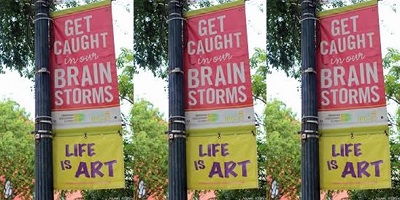
Forgiveness
November 13th, 2013
Forgiveness…is a choice, a decision. It is not earned nor is it deserved.
Forgiveness…is not condoning/excusing/forgetting/justifying/calming Down
Forgiveness…is accepting what happened/ceasing to be angry/being neutral/making yourself feel good. It is the gift you first give to yourself so you can
Quiet your angry feelings and
Change destructive thoughts.

YOUR SUCCESS IN RELATIONSHIPS AND IN LIFE IS GOING TO BE LIMITED OR ENHANCED BY HOW WELL YOU EXERCISE THESE TWO SKILLS:
- YOUR ABILITY TO CONFRONT AND RESOLVE NEGATIVE THINGS QUICKLY, DIRECTLY, LOVINGLY, THOROUGHLY AND EFFECTIVELY
- YOUR ABILITY TO LET GO AND LEAVE BEHIND THE THINGS THAT ARE NOT RESOLVABLE.
Four States of Forgiveness
November 13th, 2013
1. TO FOREGO—To leave alone; detach; take a vacation from it
2. TO FOREBEAR—To abstain from punishing; to be generous
3. TO FORGET—To refuse to dwell; to refuse to recollect; to lay to rest the emotion surrounding the memory
4. TO FORGIVE—To abandon the debt. A conscious decision to cease to harbor the resentment; to forgive the debt and give up the resolve to retaliate
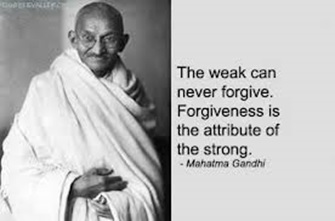
Boundaries
November 12th, 2013
We hear the phrase “set your boundaries” quite often and I’m never really sure what someone means by that. Perhaps it’s something like, “This is what I will do and this is what I won’t do.”
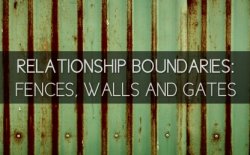 And what if we don’t “set our boundaries?” What’s so bad that could happen? Plenty, though at first pretty subtle. No, I take that back. It’s not subtle but by our denial and minimization (two handy dandy feats of our mind) we can push any consequence to the nether regions and go about our merry seemingly not bothered at all. Then, somewhere in the future, POW, we explode, we’re angry, we’re resentful, we’re depressed, we’re jealous. What the heck? Where did that come from? It was there all along but we snubbed and ignored these inevitable experiences that come from not honoring our boundaries.
And what if we don’t “set our boundaries?” What’s so bad that could happen? Plenty, though at first pretty subtle. No, I take that back. It’s not subtle but by our denial and minimization (two handy dandy feats of our mind) we can push any consequence to the nether regions and go about our merry seemingly not bothered at all. Then, somewhere in the future, POW, we explode, we’re angry, we’re resentful, we’re depressed, we’re jealous. What the heck? Where did that come from? It was there all along but we snubbed and ignored these inevitable experiences that come from not honoring our boundaries.
Any way we cannot be honest and get away with it and live a great life filled with vitality and zest and daringness and health? Nope. Why not? Cuz that just isn’t life’s design. Kind of like asking, “How come if I am on the ice rink with tennis shoes I keep slipping?” Or, “How come if I am wearing hockey skates on a basketball court I keep losing the game?” Read more »
Emotional Quicksand
November 11th, 2013
Have you ever felt like you were trapped in emotional quicksand? You’re moving along confidently in the world and then – wham! – your next step lands you in a quagmire of depression, anxiety, anger, discontent, loneliness, or grief. Or…maybe all of the above.
Being of the human persuasion, we have a lot of things happen to us in life, some of which are good and some of which aren’t so good. These latter events are the ones that often make us feel stuck and as though we’re sinking fast. Most of us struggle mightily to get out of the trap. It’s scary and it feels like we’re being sucked, down, down, and there is nothing we can do to get out to get out of the trap. We frantically flail and flail around, trying desperately to save ourselves, only to find that we’re getting pulled down even faster and the quicksand’s grip has become even tighter. When we are stuck in quicksand, our immediate impulse is to struggle and fight to get out. BUT that’s exactly what we mustn’t do in quicksand—because as we put weight down on one part of our body (our foot), it goes deeper. So the more we struggle, the deeper we sink—and the more we struggle.  It’s very much a no-win situation. With quicksand, there’s only one option for survival—to spread the weight of our body over a large surface area—lay down. It goes against all of our instincts to lay down and really be with the quicksand, but that’s exactly what we have to do. So it is with distress— we struggle and fight against it, but we’ve perhaps never considered just letting it be, and being with the distressing thoughts and feelings. But if we did, we’d find that we get through it and survive and thrive far more effectively than if we’d fought and struggled.
It’s very much a no-win situation. With quicksand, there’s only one option for survival—to spread the weight of our body over a large surface area—lay down. It goes against all of our instincts to lay down and really be with the quicksand, but that’s exactly what we have to do. So it is with distress— we struggle and fight against it, but we’ve perhaps never considered just letting it be, and being with the distressing thoughts and feelings. But if we did, we’d find that we get through it and survive and thrive far more effectively than if we’d fought and struggled.
Guess what? This is a hard thing to do because, just as our first reaction to finding our bodies sinking is to panic and thrash around to save ourselves, so our reaction is to sinking emotionally. It’s counter-intuitive and not very natural to relax and stop struggling when everything inside is yelling, “Do something!”
Truth be told, though, we are doing something when we stop struggling against our emotions. We are allowing. We are creating space for our emotions to just be rather than trying to suppress them or make them go away. We are floating with the quicksand and making the slow, steady progress we need to get to firmer ground.
Being You
October 23rd, 2013
 is when another’s needs and wants are as precious and important to you as your own. Not more important than your own because then your importance is diminished in your own eyes and in the eyes of your partner (how you treat yourself is how your partner may likely treat you). Not less important than your own because that leads to being dismissive of the importance of your partner in your life. It is when we refuse to use anything from the past against another in the present. We refuse the impulse to use another’s vulnerability against, leaving them open to feeling shame or worse yet, regret that they confided in another.
is when another’s needs and wants are as precious and important to you as your own. Not more important than your own because then your importance is diminished in your own eyes and in the eyes of your partner (how you treat yourself is how your partner may likely treat you). Not less important than your own because that leads to being dismissive of the importance of your partner in your life. It is when we refuse to use anything from the past against another in the present. We refuse the impulse to use another’s vulnerability against, leaving them open to feeling shame or worse yet, regret that they confided in another.
 is to bear conflict with calmness. It is the realization that life, day to day, moment by moment, is changing. The only experience in life that is predictable is that it is unpredictable. Everything comes and goes. Within every beginning is its ending. And we, who hold on to constancy with dear life so we can have some sense of being in control, are called upon to develop an appreciation and acceptance of change in our lives a a fundamental characteristic of life. My assumptions about others intentions are not necessarily correct. And to live life as an art is to pause and consider the following: our assumptions of course seem real to us because they are our own creations. Whether they are correct or not is, actually, coincidence. It is always best to check out our assumptions with another. Time and again, if we nurture patience and strength to do this, we will be amazed at what we find that we did not know; we will be amazed at what we see that we did not see was there to see! It may do our hearts good to reflect on the words of the poet Rilke, ““Be patient toward all that is unsolved in your heart and try to love the questions themselves, like locked rooms and like books that are now written in a very foreign tongue. Do not now seek the answers, which cannot be given you because you would not be able to live them. And the point is, to live everything. Live the questions now. Perhaps you will then gradually, without noticing it, live along some distant day into the answer.”
is to bear conflict with calmness. It is the realization that life, day to day, moment by moment, is changing. The only experience in life that is predictable is that it is unpredictable. Everything comes and goes. Within every beginning is its ending. And we, who hold on to constancy with dear life so we can have some sense of being in control, are called upon to develop an appreciation and acceptance of change in our lives a a fundamental characteristic of life. My assumptions about others intentions are not necessarily correct. And to live life as an art is to pause and consider the following: our assumptions of course seem real to us because they are our own creations. Whether they are correct or not is, actually, coincidence. It is always best to check out our assumptions with another. Time and again, if we nurture patience and strength to do this, we will be amazed at what we find that we did not know; we will be amazed at what we see that we did not see was there to see! It may do our hearts good to reflect on the words of the poet Rilke, ““Be patient toward all that is unsolved in your heart and try to love the questions themselves, like locked rooms and like books that are now written in a very foreign tongue. Do not now seek the answers, which cannot be given you because you would not be able to live them. And the point is, to live everything. Live the questions now. Perhaps you will then gradually, without noticing it, live along some distant day into the answer.”
Joyce Lynne Juster, M.A., LP copyright @2013.
